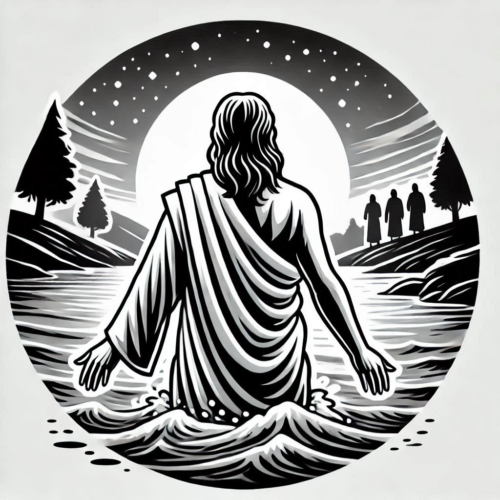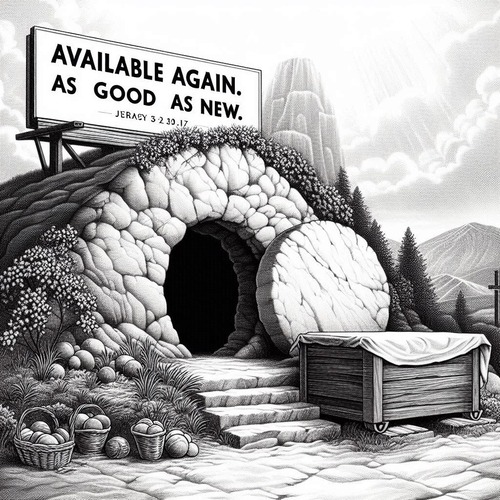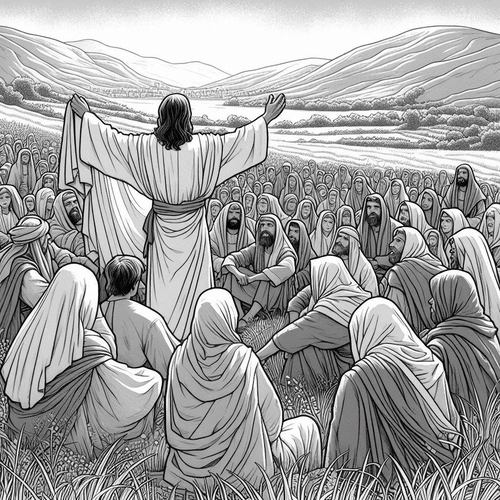Living Waters and Jesus: What’s The Connection?
The theme of living waters threads through Scripture like a life-giving stream, carrying profound spiritual significance that speaks to the deepest needs of the human heart. In our world of bottled water and indoor plumbing, we might miss the powerful imagery this phrase held for ancient readers. Yet understanding the phrase opens up a wellspring of spiritual truth that remains as relevant today as it was thousands of years ago.
LIVING WATERS: THE PHYSICAL CONTEXT
In the ancient Near East, living waters referred to flowing water from springs, streams, and rivers—water that moved, bringing freshness and life. Unlike stagnant pools or stored cistern water, living waters were pure, fresh, and self-replenishing. In the arid landscape of Palestine, where summer drought was a constant threat, flowing water represented the difference between life and death.
Archaeological discoveries have revealed elaborate water systems in ancient cities, testifying to the paramount importance of reliable water sources. Yet beyond mere survival, living waters came to represent something far more profound in biblical teaching.
THE OLD TESTAMENT FOUNDATION
Divine Provision: From the garden of Eden with its life-giving rivers to the wilderness wanderings, God consistently reveals Himself as the source of living waters. This revelation takes on even deeper significance when we understand Christ Himself was present in these Old Testament water provisions. The Apostle Paul unveils this profound truth in 1 Corinthians 10:4: when the Israelites “drank from the spiritual Rock that followed them… that Rock was Christ.”
This extraordinary revelation transforms our understanding of the dramatic scene at Horeb, where Moses struck the rock to provide water for the complaining Israelites (Exodus 17:1-7). It wasn’t merely a miraculous provision of physical water—it was a foreshadowing of Christ, the true Rock, who would be struck to provide living waters for His people. Later, at Meribah (Numbers 20:2-13), Moses was commanded only to speak to the rock—not strike it. This suggests Christ would be struck once for all time (Hebrews 7:27).
Through the prophet Jeremiah, God declared Himself to be “the fountain of living waters” (Jeremiah 2:13), contrasting His provision with the broken cisterns people foolishly dig for themselves. The imagery again finds its fulfillment in Christ, who is both the Rock of our salvation and the source of living water. The prophets used this water imagery to paint vivid pictures of God’s provision for His people’s deepest needs. Ezekiel’s vision of water flowing from the temple (Ezekiel 47) portrayed the expanding influence of divine grace, turning deserts into gardens and bringing life wherever it flowed – a picture ultimately fulfilled in Christ and His church.
“For my people have committed two evils: they have forsaken me, the fountain of living waters, and hewed out cisterns for themselves, broken cisterns that can hold no water.” (Jeremiah 2:13)
Spiritual Symbolism: In Old Testament wisdom literature, living waters came to be associated with divine wisdom and instruction. The book of Proverbs presents wisdom as a life-giving stream, offering spiritual refreshment and guidance. The imagery pointed to God’s covenant faithfulness and His promise of spiritual restoration for His people.
THE NEW TESTAMENT FULFILLMENT
Christ as Living Water: The symbolism of living waters finds its ultimate fulfillment in Jesus Christ. His conversation with the Samaritan woman at Jacob’s well (John 4) marks a pivotal moment where physical and spiritual waters converge. Jesus offered her not just refreshment for her body but eternal satisfaction for her soul—living water springing up to eternal life.
Later, at the Feast of Tabernacles, Jesus stood and proclaimed, “If anyone thirsts, let him come to me and drink” (John 7:37). This dramatic invitation revealed Him as the source of living waters promised in the Old Testament, the one through whom the Spirit would be given to believers.
“Jesus answered her, ‘If you knew the gift of God, and who it is that is saying to you, “Give me a drink,” you would have asked him, and he would have given you living water.’” (John 4:10)
The Spirit’s Work: The living waters Jesus promises flow through the work of the Holy Spirit. This divine spring brings new life in regeneration, enabling spiritual understanding and faith where there was only deadness before. Like a hidden spring breaking forth, the Spirit’s work manifests in transformed lives and growing holiness.
THEOLOGICAL IMPLICATIONS
Exploring the theme of living waters in Scripture reveals crucial spiritual truths. First, it emphasises our complete dependence on divine provision. Just as no one can create a natural spring, we cannot generate spiritual life by our own efforts. The water of life flows from God’s throne alone.
Second, it highlights the transformative nature of divine grace. Living waters don’t merely refresh; they revolutionise barren landscapes into fertile gardens. Similarly, God’s grace doesn’t just improve people; it fundamentally transforms them from spiritual death to life.
“Then the angel showed me the river of the water of life, bright as crystal, flowing from the throne of God and of the Lamb.” (Revelation 22:1)
PRACTICAL APPLICATIONS
Personal Faith: This teaching calls us to honest self-examination. Are we trying to satisfy our spiritual thirst from broken cisterns of our own making? True satisfaction comes only from the living waters God provides. We see evidence of these waters in:
- A growing desire for God’s Word
- Increasing love for God and others
- Fruit of the Spirit in our lives
- A deepening awareness of our dependence on divine grace
Corporate Worship: The church serves as a channel of living waters in the world. Through the preaching of the Word and administration of the sacraments, God’s people experience regular refreshment from these spiritual springs. Together, we become a life-giving community, sharing the water of life with a spiritually parched world.
CONCLUSION
Living waters represent far more than mere physical refreshment. They embody the full provision of God’s grace in Christ, flowing from His sovereign goodness to satisfy our deepest needs. This stream of grace, once started, never runs dry but flows eternally, transforming lives and communities through its life-giving power.
Unlike the world’s temporary satisfactions that leave us thirsting for more, the living waters provide lasting fulfillment. They flow from the throne of God, through the work of Christ, by the power of the Spirit, bringing life wherever they go. In a world dying of spiritual thirst, nothing could be more precious than these ever-flowing streams of grace.
Living Waters—Related FAQs
How do living waters connect to the Temple in the Bible? The Temple connection begins with Ezekiel’s vision of water flowing from the temple threshold, bringing life wherever it flows (Ezekiel 47:1-12). The prophetic picture finds deeper meaning when Jesus—during the Temple’s water libation ceremony—declares Himself to be the source of living water (John 7:37-39). The imagery culminates in Revelation 22:1, where John sees the river of life flowing from God’s throne in the New Jerusalem, showing Christ Himself is the true Temple from whom living waters eternally flow.
- Why did Jesus choose the water libation ceremony to declare He is the source of living water? The water libation ceremony at the temple was a significant part of the Feast of Tabernacles, celebrated by the Israelites to commemorate God’s provision during their desert wanderings. Priests would draw water from the Pool of Siloam and pour it out at the Temple altar, symbolising divine blessing and the hope for future rain. Jesus’ declaration during this ceremony (John 7:37-39) dramatically positioned Him as the ultimate source of spiritual sustenance, aligning with the prophetic imagery of living waters and revealing His role as the Messiah who provides eternal life. This connection underscores the profound spiritual implications of Jesus’ offer to quench the deepest thirst of humanity.
- What is the connection between living waters and the Garden of Eden? The Bible begins with rivers watering the Garden of Eden (Genesis 2:10-14) and ends with the river of life flowing through the New Jerusalem (Revelation 22:1-2). This forms a powerful biblical bookend showing God’s provision of life-giving water in both paradise lost and paradise restored. Isaiah’s prophecies (35:6-7) of springs bursting forth in the desert point to Christ’s work of new creation, restoring and surpassing Eden’s original glory.
- How do the Exodus water miracles point to Christ? Paul reveals Christ was the spiritual Rock who followed Israel, providing water in the wilderness (1 Corinthians 10:4). The miraculous water provisions at Marah, Horeb, and Meribah weren’t merely physical sustenance but pointed to Christ as the true source of spiritual life. These events, along with the Red Sea crossing, prefigured baptism and the cleansing work of Christ (1 Corinthians 10:1-2).
What do the prophets teach us about living waters? The prophets use living waters to represent God’s salvation, cleansing, and spiritual renewal. Isaiah promises joyful drawing from “wells of salvation” (Isaiah 12:3), while Zechariah foretells a fountain opened for cleansing from sin (Zechariah 13:1). These prophecies find their fulfillment in Christ, who provides the true living water that satisfies spiritual thirst (John 4:14) and cleanses from sin.
- How do living waters relate to the sacraments? The flow of water and blood from Christ’s pierced side (John 19:34) connects to both baptism and the Lord’s Supper. The washing of regeneration (Titus 3:5) and the washing of water with the word (Ephesians 5:26) point to baptism’s significance as an outward sign of the Spirit’s cleansing work. The sacramental imagery is grounded in Christ’s role as the source of living water for His church.
- What does wisdom literature teach us about living waters? Wisdom literature often depicts divine wisdom as life-giving water. Proverbs describes the words of the wise as “deep waters” and “flowing brooks” (Proverbs 18:4) and portrays the righteous person’s mouth as “a fountain of life” (Proverbs 10:11). These metaphors connect to Christ, who is the embodiment of divine wisdom (1 Corinthians 1:24) and the source of all spiritual understanding.
Why is the concept of living waters still relevant for believers today? Living waters represent the ongoing, life-giving presence of the Holy Spirit in believers’ lives (John 7:38-39). Just as physical water is essential for life, Christ’s living water is crucial for spiritual vitality and growth. The promise that rivers of living water will flow from within believers (John 7:38) points to our role as channels of God’s grace in a spiritually thirsty world, making this ancient metaphor perpetually relevant for Christian life and ministry.
Living Waters—Our Related Posts
Editor's Pick

Why Do People Hate the Doctrine of Election?
…WHEN THEY REALLY SHOULDN’T Few Bible doctrines provoke stronger reactions than election. The idea that God chose some for salvation [...]

The Doctrine of Providence: Does God Really Govern All Things?
You’re sitting in the doctor’s office when the diagnosis lands like a thunderclap. Your mind races: Why this? Why now? [...]

No Decay, No Defeat: What It Means That Christ’s Body Saw No Corruption
On the Day of Pentecost, Peter stood before thousands and made a startling claim: David's body decayed in the tomb, [...]
SUPPORT US:
Feel the Holy Spirit's gentle nudge to partner with us?
Donate Online:
Account Name: TRUTHS TO DIE FOR FOUNDATION
Account Number: 10243565459
Bank IFSC: IDFB0043391
Bank Name: IDFC FIRST BANK






